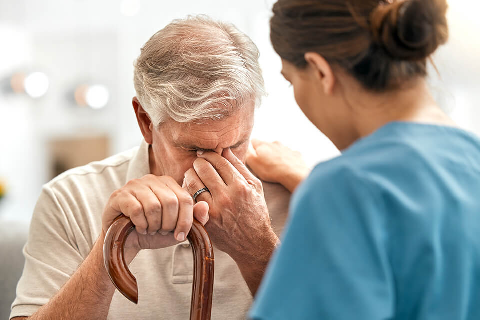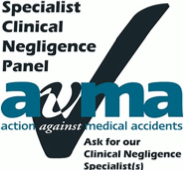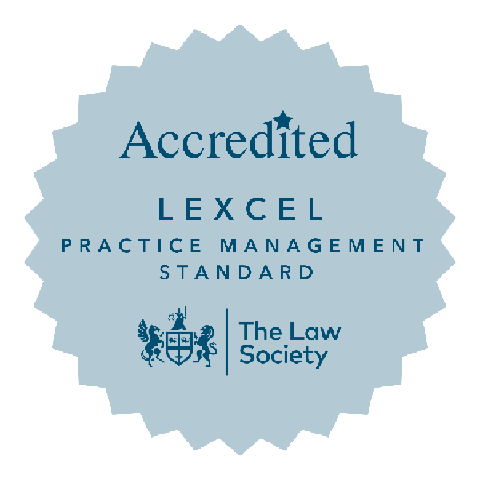- Home >
- Nursing Home Negligence Claims
As people get older, they rely on nursing homes to keep them safe. But if healthcare professionals in these environments fail to provide a suitable standard of care, residents can develop infections, pressure sores and other life-changing complications.
While we can’t undo the emotional or physical hardship of care home neglect, the answers we uncover and the settlements we secure have helped hundreds of clients and their family members find closure after these inexcusable incidents.

Do you have a nursing home negligence claim?
Most nursing homes provide a high standard of care that protects the wellbeing of their vulnerable residents. But sometimes care home staff make mistakes or oversights that lead to avoidable pain and suffering.
Whether medication errors allowed an infection to spread, or mismanaged pressure sores led to a loss of independence. We understand the pain that negligent care can cause, and work tirelessly to secure the right outcome for you and your loved ones.

The specialist nursing home claims solicitors for Essex & East Anglia
When the healthcare professionals you or your loved one rely on fall short of standards, it can leave lasting emotional and physical scars. We handle every case with the utmost care and attention to help ensure you get the justice you deserve.
We make the claims process as straightforward as possible, recovering millions in compensation for those affected by negligent care. With over 30 years devoted to investigating and negotiating settlements for our clients on a ‘no win, no fee’ basis, we resolve 96% of our claims outside the courtroom.
What does our nursing home negligence claim process look like?

A free initial consultation
Call us, request a callback or complete our online form and we’ll assess if you have a valid medical negligence claim.

Funding your claim
Discover the ways we can fund your claim without you paying a penny at any stage of the process.

Investigating evidence
We gather medical records, witness statements and more to learn what happened to you and prove your claim.

Instructing independent medical experts
We work with impartial, experienced medical experts to establish whether your injuries were due to substandard medical care.

Valuing your claim
We assess your health and financial losses to accurately estimate how much compensation your claim is worth.

Presenting your case
We contact the Defendants and the Courts on your behalf to set out your allegations and receive a response.

Negotiating a settlement
We work to achieve a fair settlement for you outside the courtroom – this is how 96% of our cases end.

Preparing for Trial
If we must proceed to Trial, we fully prepare you for what to expect so you receive the right result in court.
FAQs about nursing home negligence claims
What is nursing home negligence?
In care homes, medical professionals have a duty to care for patients, providing them with nutrition and medical treatment.
But when a lack of care and consideration is given to these responsibilities, and residents endure avoidable pain or suffering as a result, this is considered nursing home negligence.
While these incidents are thankfully few and far between, subpar clinical care does happen. Some of the most common examples include:
- Missed signs of pressure sores or falls
- Misdiagnosed or poorly managed infections
- Inadequate provision of food and water
- Improper administration of medicines or dosages
- Poor hygiene practices
- Mismanaged patient medical records
- Inexcusable mistakes during catheterisation
It is important to note that any intentional act of abuse towards an elderly patient will usually be classified as an assault, and should therefore be handled by a solicitor that specialises in that field. However, the nursing home in question may still be required to pay the claimant compensation for the abuse they received.
What are the consequences of care home negligence?
Nursing home negligence can take many forms and lead to a wide range of consequences, such as:
- Bronchial pneumonia
- Dehydration
- Malnourishment
- Hypothermia
- Pressure sores
If an elderly resident does not receive regular care, monitoring or interaction from nursing staff, this may also result in isolation, depression and poor mental health – issues that can further impact their physical wellbeing.
In extreme cases, negligent care may sadly result in death by medical negligence.
How do I know if I have a valid negligence claim against a nursing home?
To prove you or a loved one has a valid nursing home negligence claim, we must answer three important questions:
- Did a healthcare professional breach their duty of care?
- Did you or your family member suffer excessive injury, suffering or loss?
- Was the healthcare professional’s breach of duty the direct cause of this suffering?
For a claim to be considered valid, it must meet all three criteria. If it does not satisfy each of the above questions, then you do not have grounds for a claim.
At Gadsby Wicks, our highly experienced solicitors have a strong track record of resolving nursing home negligence claims. This means we can give you an honest, accurate answer as to whether your claim is likely to succeed early on in the process.
If you would like to find out whether you or someone you love can claim compensation, answer a few quick questions on our “Do I have a claim?” form.
Can I make a claim on behalf of a family member?
Yes, if a family member affected by medical negligence cannot bring a claim themselves, you or another relative can become their Litigation Friend – acting as the claimant across their case and making decisions in their best interests.
This might be required in cases where an individual lacks the mental capacity to make certain decisions for themselves, or in circumstances when a claimant has unfortunately passed away.
How much compensation can be claimed for nursing home negligence?
The value of you or your family members’ nursing home negligence claim will depend on the circumstances surrounding the case.
While we know that no amount of compensation can make up for what happened, successful claims can help ease the financial burden on you or your family. The answers we find may also make moving on from what happened a little easier, and help prevent similar mistakes from happening to others in future.
How long does it take to resolve a care home negligence claim?
In most circumstances, we would expect a care home negligence claim to take between two and five years to resolve.
However, the time it takes for you or your loved one’s individual case to settle will depend on various factors, such as the stance taken by the Defendants and any specific complications involved in the case.
Contact our expert nursing home negligence claims solicitors
If you or someone you love has been impacted by substandard care in a nursing home, our team is here to listen and advise you on your next steps.

Lexcel accredited medical negligence claims solicitors
We are proud to be a Lexcel-accredited practice. The accreditation is a mark of quality and comes directly from the Law Society.
A recent assessment described us as a “Centre of Excellence” and we continue to operate to the highest standards across all main areas of our field. These include client care, case management, financial management, structure and strategy, people management, risk management, information management and file management.




Industry Recognised

